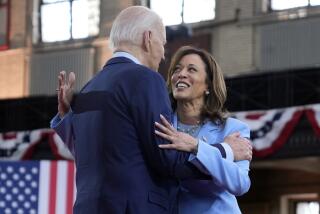The Case for Yeltsin, Given the Alternative
- Share via
If you listen to Russian democrats, the principal choice in the coming presidential election is between the pseudo-democrat, Boris Yeltsin, and the national-Bolshevik, Gennady A. Zyuganov. And it is no longer evident to many reformers that Yeltsin is the lesser evil.
Yegor T. Gaidar, the former acting prime minister, mused in a recent interview that it was academic who finally derails the economy, the Communist Party or Yeltsin’s government. Leonid Batkin, a respected liberal and a friend of Andrei Sakharov, openly welcomed a communist victory because it could finally unite the democratic forces. Perhaps most damaging to the Yeltsin cause has been the open letter written by the former head of the Presidential Human Rights Commission, Sergei A. Kovalev, who charges Yeltsin with betraying Russian democracy.
The list of Yeltsin’s sins against democracy is long: the brutal war in Chechnya, the failure to rein in corrupt officials, the purge of reformers from the government, the reliance on the security forces beholden to the president. So, when Kovalev resigned his position earlier this year, several liberals in Yeltsin’s camp followed suit. Ever since, democracy in Russia has been in a state of crisis.
The most often mentioned alternative to Yeltsin is Grigory A. Yavlinsky, head of the pro-reform Yabloko Party, who recently joined forces with two other independent presidential candidates, Stanislav Fedorov and Gen. Alexander Lebed. Together, they can draw 20% of the vote--an impressive number in the factionalized world of Russian politics, but hardly enough to stem the communist challenge.
The brightest luminaries in the Russian democratic constellation are unable to offer their supporters a coherent rationale for action. If Yeltsin and Zyuganov move into the second round (nobody is expected to garner an outright majority), the democrats will face a familiar choice. But is it really so onerous as the Russian liberal press would want us to believe?
Listen to Marietta Chudakova, one of the few intellectuals who didn’t resign her position on the Presidential Council. A liberal, a renowned literary scholar and an avowed anticommunist, Chudakova told her audiences on a recent U.S. tour that the democrats shouldn’t give up on Yeltsin. True, the Russian president made bad mistakes, most notably in Chechnya, but he protected the multiparty system, resisted the temptation to rein in the recalcitrant press, kept on track economic reforms, strengthened East-West cooperation and pledged to complete Russia’s break with its Soviet past.
The case for Yeltsin grows stronger when we look closely at post-Soviet communists and their outspoken leader. In his latest book, Zyuganov does nothing to dispel his reputation as a Bolshevik. He sings praises to Stalin’s social policies, hailing him as the greatest nation builder. Had Stalin lived a few more years, says Zyuganov nostalgically, his “ideological perestroika” would have been “irreversible.”
The latest revelations about the Communist Party’s “maximum program” that envisions the renationalization of industry and the restoration of the Soviet Union do nothing to alleviate our fears. Nor do comparisons with Eastern Europe where the left-wing parties were recently swept into power. The murderous records amassed by Russian communists, their failure to own up to their past and the penchant for crypto-Stalinist rhetoric belie their attempts to cast themselves as born-again social democrats.
I asked Chudakova what Yeltsin should do if Zyuganov wins. Her answer: “Hitler came to power through democratic elections. Would you have let him take over the presidency if you’d known what he was about to do? [If Zyuganov wins] . . . annul the election results.” This scenario wasn’t yet formally discussed, Chudakova stressed to me. It is strictly her personal opinion. But that a member of the Presidential Council who has Yeltsin’s ear is willing to discuss this option in a for-the-record interview is a portentous sign.
The dearth of decent options facing Russian democrats today is uncanny. However, there is a clear choice, and all democrats inside and outside Russia should not hesitate to make it. The democrats must unite behind a single candidate. This is the only chance to forestall the communist victory. They should canvass the electorate the way communists have done in the last two years, bring the young voters and dispirited liberals to the polling stations, do everything to defeat Zyuganov, and if their efforts fail, be ready to use extra-constitutional means to save the constitution that the communists swore to trash as soon as they come to power.
This is a troubling option for all those who believe that democratic ends must be achieved by democratic means. Annulling the presidential elections is sure to set Russian democracy back. But can we afford to dismiss this scenario, knowing what we do about Russian communists and their neo-Stalinist leader?
More to Read
Sign up for Essential California
The most important California stories and recommendations in your inbox every morning.
You may occasionally receive promotional content from the Los Angeles Times.













